|
|
|
Sort Order |
|
|
|
Items / Page
|
|
|
|
|
|
|
| Srl | Item |
| 1 |
ID:
138302
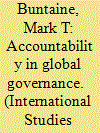

|
|
|
|
|
| Summary/Abstract |
International organizations frequently lack accountability to both states and civil society groups. States often face difficulties monitoring the actions of international organizations. Civil society groups do not often enjoy direct influence over decision-making within international organizations. To address these challenges, states have created accountability mechanisms for international organizations. Accountability mechanisms allow civil society groups to submit complaints about the performance of international organizations. They take the form of ombudsmen offices, accountability panels, and complaint procedures. Little is known about when and why these mechanisms constrain behavior by international organizations that runs counter to the mutual interests of states and civil society groups. Using the World Bank Inspection Panel as a test case, I show that monitoring by civil society groups alters lending at the World Bank when it enhances oversight by powerful states. By combining their abilities in sanctioning and monitoring, states and civil society groups can promote accountability at international organizations.
|
|
|
|
|
|
|
|
|
|
|
|
|
|
|
|
| 2 |
ID:
089978
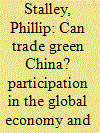

|
|
|
|
|
| Publication |
2009.
|
| Summary/Abstract |
How does participation in the global economy influence the pollution management practices of firms in a developing country? Research on trade and the environment leads one to anticipate that integration into the international economy should enhance domestic firm environmental behavior. Integration facilitates access to cleaner technology, exposes domestic firms to global norms of corporate environmentalism, and compels developing country firms to meet trading partners' environmental standards or risk losing market access. This article tests these propositions by exploring the environmental compliance of internationally oriented firms in China-a country whose rapid economic expansion and increasingly prominent role as a foreign investor have considerable implications for protection of the global environment. It finds that there is only modest market-induced enhancement of environmental performance among Chinese companies. In terms of their compliance with environmental law, Chinese firms with connections to the global economy are either no better than domestically oriented companies or, in the case of firms that export heavily, are worse.
|
|
|
|
|
|
|
|
|
|
|
|
|
|
|
|
| 3 |
ID:
105766
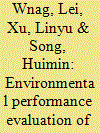

|
|
|
|
|
| Publication |
2011.
|
| Summary/Abstract |
In line with rapid economic development, urban energy consumption is increasing rapidly, resulting in environmental problems. After considering several methods to evaluate the environmental performance of energy use, including: energy ecological footprint, input-output analysis, emergy-exergy analysis, and multi-criteria decision-making, an environmental performance evaluation model is proposed, which combines the analytical hierarchy process, fuzzy extent analysis, and membership degree analysis. In the model, 18 sub-indicators of environmental performance from energy use planning are classified into four categories: structure of energy use and industry, technology and efficiency of energy use, environmental impacts caused by energy use, and the socio-economic benefits of energy use. Membership degree analysis is applied to each indicator. Three energy use scenarios which are, respectively, environment-friendly, technology-led, and economic policy-led are evaluated. The results show that the technology-led energy use planning is best. The sustainable energy use policies are proposed from three aspects, including optimizing the energy use and industrial structure, encouraging development of energy-saving and air pollution control technologies, and enhancing legislation on energy use management. The policies are helpful to optimize the trade-offs between economic growth and environmental protection in Beijing.
|
|
|
|
|
|
|
|
|
|
|
|
|
|
|
|
| 4 |
ID:
132266
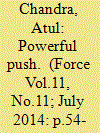

|
|
|
|
|
| Publication |
2014.
|
| Summary/Abstract |
Aero engines continue to push the boundaries of technology in the quest to cater for increased performance and substantially improved fuel efficiency, In February this year Rolls-Royce (RR) provided details of two advanced aero engines which could be ready in just a decade. According to Colin Smith, Rolls-Royce director - engineering and technology "These new designs are the result of implementing our ongoing technology programmes. They are designed to deliver what our airframe and airline customers tell us they need: even better fuel efficiency, reliability and environmental performance."
|
|
|
|
|
|
|
|
|
|
|
|
|
|
|
|
| 5 |
ID:
143783
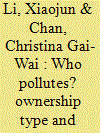

|
|
|
|
|
| Summary/Abstract |
What is the relationship between ownership type and environmental performance in Chinese firms? Using a survey of over 1,000 industrial firms in 12 Chinese cities in 2006, this article tests a number of competing hypotheses linking ownership type to environmental performance. The results show that small and medium state-owned enterprises (SOEs) on average spend less on pollution abatement technologies and are less likely to meet national emissions standards, compared to privately owned enterprises (POEs) and foreign invested enterprises (FIEs). However, the environmental performance of the largest SOEs matches that of their private and foreign counterparts. These findings are complemented by qualitative interviews and archival research conducted in 2012.
|
|
|
|
|
|
|
|
|
|
|
|
|
|
|
|
|
|
|
|
|